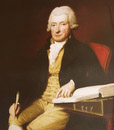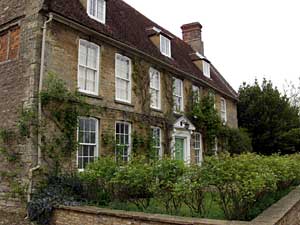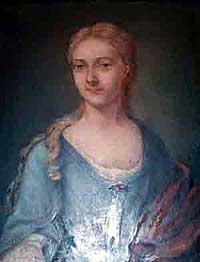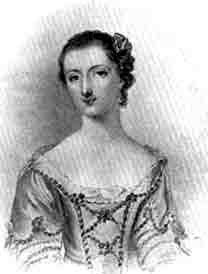|
||||||||||||||||||||||||
|
For many years there had been growing dissatisfaction with Orchard Side. The owner of the large estate at Weston Underwood, a neighbouring village some two miles from Olney, offered Cowper and Mrs Unwin The Lodge in the village. They gladly accepted Sir George Throckmorton's proposal. Cowper's cousin Lady Hesketh organised the move. While at Weston Underwood, Cowper received from his Donne cousins in Norfolk a portrait of his mother. He wrote a moving poem 'On Receipt of my Mother's Picture'. It is said that not a day went by without Cowper thinking of the mother he lost when he was six. In 1784 Cowper began his translation of Homer. It was finally published in 1791, and he was paid £1000 for the copyright. Prior to that, however, in 1785 he was again needing financial support from his relatives. An anonymous donor, probably his cousin Lady Hesketh settled on him an annuity of £50 per annum. Formerly Harriot Cowper, Lady Hesketh she was one of the young ladies that Cowper made giggle in the home of her father Ashley Cowper. By 1786 her husband Sir Thomas Hesketh had died and she now rented a floor in Olney Vicarage from June to November. It was she who instigated the move from Olney to Weston Underwood in the same year. No sooner had they settled than news came of the death of Mary Unwin's son, William. Cowper had always maintained a close friendship with William and he became greatly depressed; however after six months he had recovered sufficiently to resume his Homeric task of translation. A visit by Newton now actively involved in the Anti-Slave Trade Movement led to Cowper publishing the lines 'Pity for PoorAfricans' in the Northampton Mercury 9.8.1788. In 1784 Cowper began his translation of Homer. It was finally published in 1791, and he was paid £1000 for the copyright. Mary Unwin's health worried Cowper greatly. She had suffered two strokes and her arm was partially paralysed. After 1792 her health rapidly declined and it was now Cowper's turn to nurse her. In 1794 Lady Hesketh took over the household management at Weston Underwood much to Mary Unwin's distress. By this time William Hayley was able to obtain a Crown pension of £300 per annum for Cowper and although this alleviated financial worries, the strain of Mary's condition brought Cowper to the breaking point. Finally in 1796 the two invalids were moved to Norfolk in the hope that a change of scene would help. In fact the elderly couple were virtually forced to move to Norfolk. It became obvious that Mary Unwin could no longer manage the household and Lady Hesketh, who lived mostly in London, could not keep spending months at a time in Weston Underwood. They lived in various lodgings with Cowper's maternal cousin, John Johnson before finding a home with him in East Dereham. Lady Hesketh never visited Cowper again. However this did not prevent her from interfering in Cowper's affairs. It was at her instigation that Cowper's long standing servants Sam Roberts and his wife were sent back to Olney. New servants were installed. Lady Hesketh was also responsible for Hannah Wilson, Mary Unwin's niece being removed to Norwich and apprenticed there. This had a detrimental effect on Mary Unwin's condition and to Cowper's despair in December 1796 she died. Although Cowper had sat with her a few hours before her death, she was buried at night without her companion Cowper being told. Johnson was fearful of the effect of the burial service on Cowper's mental state. He did manage to complete some work for the Second Edition of Homer 1799 and just before Christmas that year he wrote his last verse The Castaway. His despair is almost palpable in these lines. No voice divine the storm allay'd, William Cowper died on 25th April 1800 of a "worn out constitution". He is buried in East Dereham Church.
|
|
|||||||||||||||||||||||
|
||||||||||||||||||||||||




